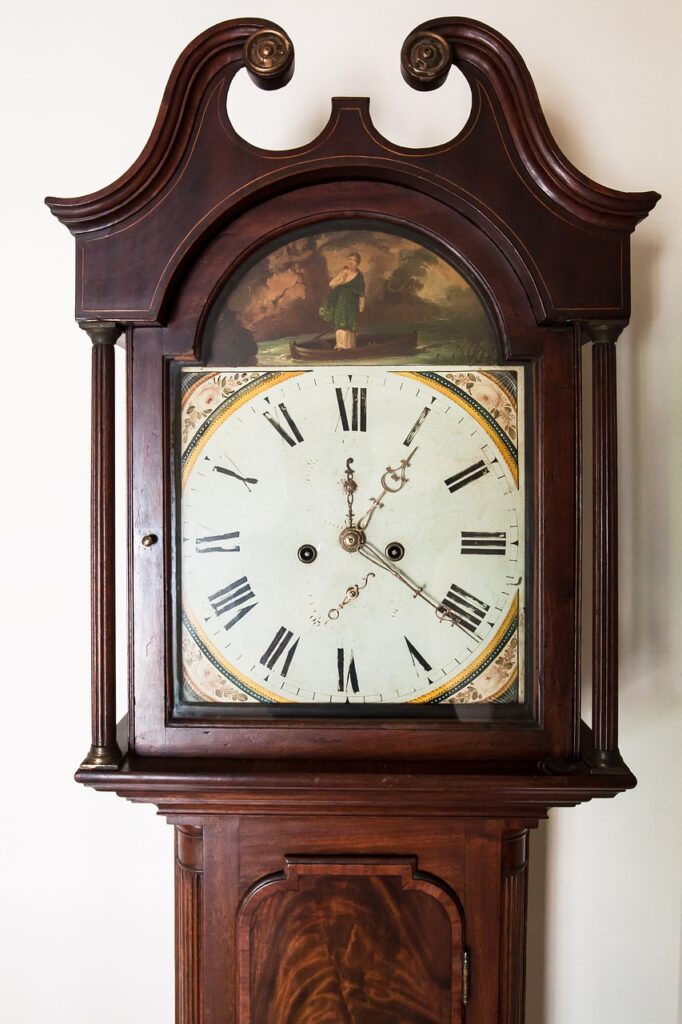Table of Contents
The Best Oil for Grandfather Clocks and Application Tips

Grandfather clocks can last generations, but proper care is required to keep their form and function optimal through the years. Apart from regular dusting, oiling your grandfather clock is essential to ensure its mechanical components work smoothly and efficiently.
Most models require oiling every two years. However, the frequency will actually depend on the age of the clock, the environmental conditions around it, and the type of oil to be used. The key to oiling your clock is to add it in small doses and apply it precisely throughout the process. Going overboard and fumbling with the grease could do more harm than good to your clock, so it’s best to know the proper way to do it.
A good place to start is knowing what is the best oil for grandfather clocks. But before that, let’s delve into some key factors impacting how often you should oil your clock.
How Age Factors in
If your grandfather clock is less than a decade old, you only need to oil it every two to three years. However, if your clock is over ten years old, it would require oiling every one to two years. This is because older clocks show more signs of wear and tear and, therefore, require more frequent lubrication.
The Environment
The climate and environment where your clock is placed can also impact how often you should oil your clock. Dry climates tend to cause the parts to dry out, and, therefore, the clock needs more frequent oiling. A humid environment or rainy climate provides natural lubrication to the clock’s parts, so you can oil your clock less frequently.
Type of Oil
Using high-quality synthetic oils requires less frequent oiling. You may also refer to the manufacturer’s manual for their oil type recommendations and frequency of application.
Top Oil Picks for Grandfather Clocks
Your best oil choice for a grandfather clock would be high-quality synthetic oils. These oils have a longer shelf life, slow oxidation, and are more stable than traditional oils. They do not leave any residue and work well in gently greasing the gears.
Some examples of synthetic oil brands trusted for clock maintenance are JD Windles, Horace Whitlock, Moebius, and Liberty. These brands of oils are highly recommended for their optimal viscosity and flow, consistency of quality over time, and non-corrosive quality.
They do not damage the brass parts, and they reliably give the pivot holes and bushings the right support to move smoothly. These oil brands have been proven to give grandfather clocks the optimum care they need to keep ticking in tip-top shape and sound.
Oil Types to Avoid
Not all oils can be used to lubricate your grandfather clock, as some may damage the parts and cause your clock to malfunction or stop working. Steer clear of mineral oils and other natural oils as they tend to solidify, attract dirt, form residues, and damage the clock’s delicate mechanisms.
Oils like WD-40, cooking oils, motor oils, multi-purpose oils, mineral oils, and automotive greases tend to be heavy and are not suitable for your precious clock.
Signs that Your Grandfather Clock Needs Oiling
Here are some signs that your grandfather clock is in need of oiling.
- The clock hands are sticking, lagging, or unsteady
- It takes more effort than usual to wind it
- It has irregular ticking sounds
- It shows significant wear in pivot holes and bushings
How to Properly Oil Your Grandfather Clock
Here are some essential reminders if you plan to DIY oiling your clock.
- Use appropriate gloves: cotton for wooden parts and latex for metal parts.
- Set up a cloth-covered table to place the parts as you disassemble them.
- Have small containers ready to hold the clock’s small parts.
- Gently clean the pivot holes and bushings using a cotton swab to remove any old oil or dust.
- Check for the friction points or the points where the gears and levers touch the clock plates.
- Using an applicator, apply a tiny drop of oil on the pivot holes and bushings.
- Depending on what’s specified in the manual, you may also lubricate some special areas.
- Wipe off any excess oils using a lint-free cloth.
- Re-assemble the parts you removed and restart the clock. The ticking sound should be clear, smooth, and even.
- If you’re unsure how to do this oiling process, consider hiring a professional.
Less Friction, More Years
If the clock is not well-oiled, there will be an increase in friction that could lead to damage and faster wear and tear of the parts. Using the best oil for grandfather clocks and applying it correctly is crucial in ensuring the longevity of your grandfather clock. Help it to run smoothly by giving it the lubrication it needs based on its requirement to prevent damage and extend its lifespan for generations to come.
